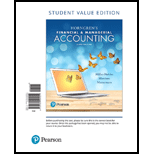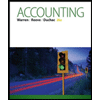
Horngren's Financial & Managerial Accounting, Student Value Edition Plus MyLab Accounting with Pearson eText -- Access Card Package (6th Edition)
6th Edition
ISBN: 9780134642857
Author: Tracie L. Miller-Nobles, Brenda L. Mattison, Ella Mae Matsumura
Publisher: PEARSON
expand_more
expand_more
format_list_bulleted
Textbook Question
Chapter 13, Problem 6QC
Assume that a company paid $6 per share to purchase 1, 100 shares of its $3 par common s tock as
- a. increased total equity by $3,300.
- b. decreased total equity by $3,300.
- c. decreased total equity by $6,600.
- d. increased total equity by $6,600.
Expert Solution & Answer
Want to see the full answer?
Check out a sample textbook solution
Students have asked these similar questions
Recently, Abercrombie & Fitch has been implementing a turnaround strategy since its sales had been falling for the past few years (11% decrease in 2014, 8% in 2015, and just 3% in 2016.) One part of Abercrombie's new strategy has been to abandon its logo-adorned merchandise, replacing it with a subtler look. Abercrombie wrote down $20.6 million of inventory, including logo-adorned merchandise, during the year ending January 30, 2016. Some of this inventory dated back to late 2013. The write-down was net of the amount it would be able to recover selling the inventory at a discount. The write-down is significant; Abercrombie's reported net income after this write-down was $35.6 million. Interestingly, Abercrombie excluded the inventory write-down from its non-GAAP income measures presented to investors; GAAP earnings were also included in the same report. Question: What impact would the write-down of inventory have had on Abercrombie's expenses, Gross margin, and Net income?
Recently, Abercrombie & Fitch has been implementing a turnaround strategy since its sales had been falling for the past few years (11% decrease in 2014, 8% in 2015, and just 3% in 2016.) One part of Abercrombie's new strategy has been to abandon its logo-adorned merchandise, replacing it with a subtler look. Abercrombie wrote down $20.6 million of inventory, including logo-adorned merchandise, during the year ending January 30, 2016. Some of this inventory dated back to late 2013. The write-down was net of the amount it would be able to recover selling the inventory at a discount. The write-down is significant; Abercrombie's reported net income after this write-down was $35.6 million. Interestingly, Abercrombie excluded the inventory write-down from its non-GAAP income measures presented to investors; GAAP earnings were also included in the same report. Question: What impact would the write-down of inventory have had on Abercrombie's assets, Liabilities, and Equity?
Need answer general Accounting
Chapter 13 Solutions
Horngren's Financial & Managerial Accounting, Student Value Edition Plus MyLab Accounting with Pearson eText -- Access Card Package (6th Edition)
Ch. 13 - Prob. 1QCCh. 13 - Prob. 2QCCh. 13 - Suppose Value Home and Garden Imports issued...Ch. 13 - Prob. 4QCCh. 13 - Prob. 5QCCh. 13 - Assume that a company paid 6 per share to purchase...Ch. 13 - Prob. 7QCCh. 13 - A small stock dividend a. decreases common stock....Ch. 13 - Prob. 9QCCh. 13 - Jackson Health Foods has 8,000 shares of 2 par...
Ch. 13 - Prob. 11QCCh. 13 - Prob. 1RQCh. 13 - Prob. 2RQCh. 13 - How does authorized stock differ from outstanding...Ch. 13 - What are the four basic rights of stockholders?Ch. 13 - How does preferred stock differ from common stock?Ch. 13 - Prob. 6RQCh. 13 - What are the two basic sources of stockholders'...Ch. 13 - Prob. 8RQCh. 13 - If stock is issued for assets other than cash,...Ch. 13 - Prob. 10RQCh. 13 - Where and how is treasury stock reported on the...Ch. 13 - What is the effect on the accounting equation when...Ch. 13 - What are the three relevant dates involving cash...Ch. 13 - How does cumulative preferred stock differ from...Ch. 13 - What is a stock dividend?Ch. 13 - Prob. 16RQCh. 13 - What are some reasons corporations issue stock...Ch. 13 - Prob. 18RQCh. 13 - Prob. 19RQCh. 13 - What does the statement of retained earnings...Ch. 13 - What is a prior-period adjustment?Ch. 13 - Prob. 22RQCh. 13 - What does earnings per share report, and how is it...Ch. 13 - What is the price/earnings ratio, and how is it...Ch. 13 - What does the rate of return on common stock show,...Ch. 13 - Prob. 13.1SECh. 13 - Prob. 13.2SECh. 13 - Prob. 13.3SECh. 13 - Prob. 13.4SECh. 13 - Prob. 13.5SECh. 13 - Prob. 13.6SECh. 13 - Prob. 13.7SECh. 13 - S13-8 Dividing cash dividends between preferred...Ch. 13 - Prob. 13.9SECh. 13 - Prob. 13.10SECh. 13 - Prob. 13.11SECh. 13 - Prob. 13.12SECh. 13 - Prob. 13.13SECh. 13 - Prob. 13.14SECh. 13 - Prob. 13.15SECh. 13 - Prob. 13.16SECh. 13 - Prob. 13.17SECh. 13 - Prob. 13.18SECh. 13 - Prob. 13.19ECh. 13 - Prob. 13.20ECh. 13 - Prob. 13.21ECh. 13 - Prob. 13.22ECh. 13 - Prob. 13.23ECh. 13 - Prob. 13.24ECh. 13 - Prob. 13.25ECh. 13 - Prob. 13.26ECh. 13 - Prob. 13.27ECh. 13 - Prob. 13.28ECh. 13 - Prob. 13.29ECh. 13 - Prob. 13.30ECh. 13 - Prob. 13.31ECh. 13 - Determining the effects of cash dividends, stock...Ch. 13 - Prob. 13.33ECh. 13 - Prob. 13.34ECh. 13 - Prob. 13.35ECh. 13 - Prob. 13.36ECh. 13 - Prob. 13.37ECh. 13 - Prob. 13.38ECh. 13 - P13-39A Organizing a corporation and issuing...Ch. 13 - Prob. 13.40APCh. 13 - Prob. 13.41APCh. 13 - Prob. 13.42APCh. 13 - P13-43A Preparing an income statement
The...Ch. 13 - Prob. 13.44APCh. 13 - Prob. 13.45APCh. 13 - Prob. 13.46BPCh. 13 - Prob. 13.47BPCh. 13 - Prob. 13.48BPCh. 13 - Prob. 13.49BPCh. 13 - Prob. 13.50BPCh. 13 - Prob. 13.51BPCh. 13 - Prob. 13.52BPCh. 13 - Prob. 54CPCh. 13 - Prob. 13.1COPCh. 13 - Prob. 13.1TICh. 13 - Prob. 13.1FSCCh. 13 - Prob. 13.1CA
Knowledge Booster
Learn more about
Need a deep-dive on the concept behind this application? Look no further. Learn more about this topic, accounting and related others by exploring similar questions and additional content below.Similar questions
arrow_back_ios
SEE MORE QUESTIONS
arrow_forward_ios
Recommended textbooks for you
 Cornerstones of Financial AccountingAccountingISBN:9781337690881Author:Jay Rich, Jeff JonesPublisher:Cengage LearningPrinciples of Accounting Volume 1AccountingISBN:9781947172685Author:OpenStaxPublisher:OpenStax College
Cornerstones of Financial AccountingAccountingISBN:9781337690881Author:Jay Rich, Jeff JonesPublisher:Cengage LearningPrinciples of Accounting Volume 1AccountingISBN:9781947172685Author:OpenStaxPublisher:OpenStax College Accounting (Text Only)AccountingISBN:9781285743615Author:Carl Warren, James M. Reeve, Jonathan DuchacPublisher:Cengage Learning
Accounting (Text Only)AccountingISBN:9781285743615Author:Carl Warren, James M. Reeve, Jonathan DuchacPublisher:Cengage Learning

Cornerstones of Financial Accounting
Accounting
ISBN:9781337690881
Author:Jay Rich, Jeff Jones
Publisher:Cengage Learning

Principles of Accounting Volume 1
Accounting
ISBN:9781947172685
Author:OpenStax
Publisher:OpenStax College

Accounting (Text Only)
Accounting
ISBN:9781285743615
Author:Carl Warren, James M. Reeve, Jonathan Duchac
Publisher:Cengage Learning
Dividend explained; Author: The Finance Storyteller;https://www.youtube.com/watch?v=Wy7R-Gqfb6c;License: Standard Youtube License